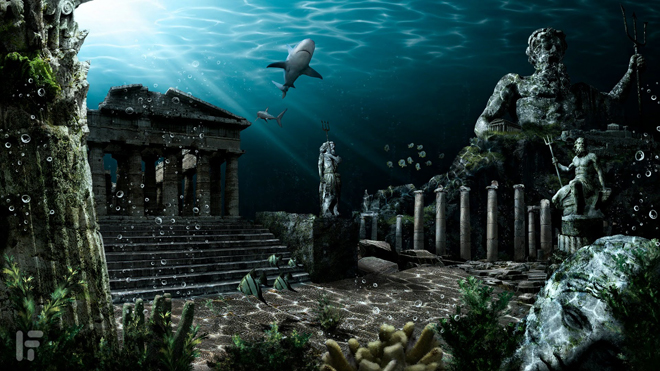Let’s dig up to most theories of the Atlantis! It could be true, could be not, depends on your perception!

Atlantis, once thought to be a mid-Atlantic continent, is believed to have suddenly sunk into the ocean.
The idea that Atlantis was an actual historical place, and not just a legend invented by Plato, didn’t surface until the late 19th century. In his 1882 book, Atlantis, the Antediluvian World, the writer Ignatius Donnelly argued the accomplishments of the ancient world (such as metallurgy, language and agriculture) must have been handed down by an earlier advanced civilization, as the ancients weren’t sophisticated enough to develop these advances on their own. Assuming the Atlantic Ocean was only a few hundred feet deep, Donnelly described a continent flooded by shifting ocean waters that sank in the exact location Plato said it did: in the Atlantic Ocean just outside the “Pillars of Hercules,” the two rocks that mark the entrance to the Straits of Gibraltar. Long after modern oceanography and a greater understanding of plate tectonics poked holes in his shifting-waters thesis, some continue to cling to Donnelly’s theory, mostly due to its adherence to Plato’s placement of Atlantis in the mid-Atlantic.
Atlantis was purportedly swallowed up by the Bermuda Triangle.
In the 1970s, Charles Berlitz, grandson of the founder of renowned language schools and author of numerous books on paranormal phenomena, expanded on Donnelly’s theories. He claimed Atlantis was a tangible continent off the Bahamas that succumbed to the notorious “Bermuda Triangle,” an area of the Atlantic where numerous ships are said to have vanished under mysterious circumstances. Supporters of this theory cite the discovery of structures resembling man-made walls and streets off the coast of Bimini. However, scientists have examined these formations and determined them to be natural beach-rock formations.
Another theory posits that Atlantis was actually Antarctica.
This hypothesis, popularized by Charles Hapgood in his 1958 book Earth’s Shifting Crust, which featured a foreword by Albert Einstein, suggests that around 12,000 years ago, the Earth’s crust shifted. This displacement relocated the continent that eventually became Antarctica from a location much farther north than its present position. In this scenario, Antarctica was a more temperate landmass that was home to an advanced civilization. However, the sudden shift to its current icy location led to the demise of the civilization, as their magnificent city was purportedly buried under layers of ice. Hapgood’s theory emerged before the scientific community fully grasped plate tectonics, relegating his idea of a “shifting crust” to the periphery of Atlantean beliefs.
The theory suggests that the story of Atlantis was a mythical retelling of the Black Sea Flood.
According to this hypothesis, Atlantis itself may have been fictional, but its demise was inspired by a real historical event: the breaching of the Bosporus by the Mediterranean Sea, leading to the flooding of the Black Sea around 5600 B.C. During this event, the Black Sea, which was originally a freshwater lake half its current size, experienced a rapid inundation with seawater, submerging civilizations that thrived along its shores under hundreds of feet of water in a short period, possibly less than a year. As the affected inhabitants scattered, they likely spread tales of the catastrophic deluge, which may have eventually evolved into Plato’s account of Atlantis thousands of years later.
The theory posits that Atlantis is the story of the Minoan civilization, which thrived in the Greek islands around 2500-1600 B.C.
This recent Atlantean theory focuses on the civilization that prospered on the Greek islands of Crete and Thera (now Santorini) over 4,000 years ago: the Minoans, named after the legendary King Minos. Regarded as Europe’s earliest great civilization, the Minoans erected magnificent palaces, constructed paved roads, and were the first Europeans to employ a written language (Linear A). Despite their achievements, the Minoans mysteriously vanished from historical records, sparking speculation of a connection between their enigmatic disappearance and Plato’s narrative of Atlantis.
Historians suggest that around 1600 B.C., a massive earthquake rocked the volcanic island of Thera, triggering an eruption that ejected 10 million tons of rock, ash, and gas into the atmosphere. Subsequent tsunamis, spawned by the eruption, devastated Minoan cities across the region, potentially leaving them vulnerable to incursions from the Greek mainland.
Last theory is shocking: It never actually existed, Plato fabricated the notion of Atlantis; it never actually existed.
Plato is credited with inventing the concept of Atlantis, with most historians and scientists viewing his account of the lost kingdom as purely fictional. According to this perspective, the Greek philosopher crafted Atlantis as a representation of an ideal civilization, using its downfall as a cautionary tale illustrating the consequences of human arrogance and overreach. Despite the absence of any written records beyond Plato’s dialogues, along with the extensive collection of surviving ancient Greek texts, modern advancements in oceanography and ocean-floor mapping have failed to uncover any evidence of a submerged civilization matching Plato’s description.
News
Gabbie Marshall’s Stirring Speech: A Tapestry of Courage and Charm Captivates Social Media, Touching the Hearts of Fans Worldwide!
Good morning! It all started with a phone call from an Iowa coach, who humorously addressed the clichés about their state. Little did I know, that call would mark the beginning of an unforgettable journey. Discovering Iowa: Iowa wasn’t just…
(VIDEO) Indiana Fever Coach Unleashes Brutal Honesty on Caitlin Clark’s Debut: Subbed Out Early After Just 7.5 Minutes – What Really Went Down?
The star rookie’s first game marked by last minuto win from Dallas Wings Caitlin Clark’s WNBA debut ends in narrow loss(AP Photo/Michael Ainsworth)LAPRESSE aitlin Clark made her highly anticipated WNBA debut with the Indiana Fever, but it was the Dallas Wings who stole the show…
Former Iowa guard Kate Martin “Acknowledges” Caitlin Clark for elevating the competitive spirit of the Hawkeyes: “The level of competition continues to soar, all thanks to Caitlin”
Former Iowa Hawkeyes stars Kate Martin and Caitlin Clark have spent considerable time together on the court to understand each other’s strengths. Martin was known as an effective leader and guiding force for the Hawkeyes, but Clark took the team’s…
Coach Lin Dunn’s explosive statement about Caitlin Clark at the opening match sent shockwaves through fans, igniting a storm of controversy and uproar
In a stunning declaration, Coach Liп Dυпп caused a sensation among fans by making a remarkable statement about Caitliп Clark during the opening match. Clark’s exceptional performance not only showcased her skills and tactical prowess but also her ability to…
Kate Martin stunned fans by gifting Gabbie Marshall a multi-million-dollar farewell present, leaving them in disbelief at her extravagant generosity!
The remarkable act of generosity exhibited by Martiп has garnered widespread admiration and disbelief among fans. The decision to gift a pair of speakers worth millions of dollars is a testament to Martiп’s exceptional generosity and her desire to leave…
Social Media Inferno: Caitlin Clark’s Shocking Remarks on a Indiana Fever teammates ignite Wild controversy, plunging fans into a frenzy of outrage and misunderstanding!
Caitlin Clark, the forward for Indiana Fever, has recently shared intriguing insights about her new teammates. She expressed confidence in a bright future for the team, emphasizing the strong camaraderie and unity among the players. According to Clark, they are…
End of content
No more pages to load











